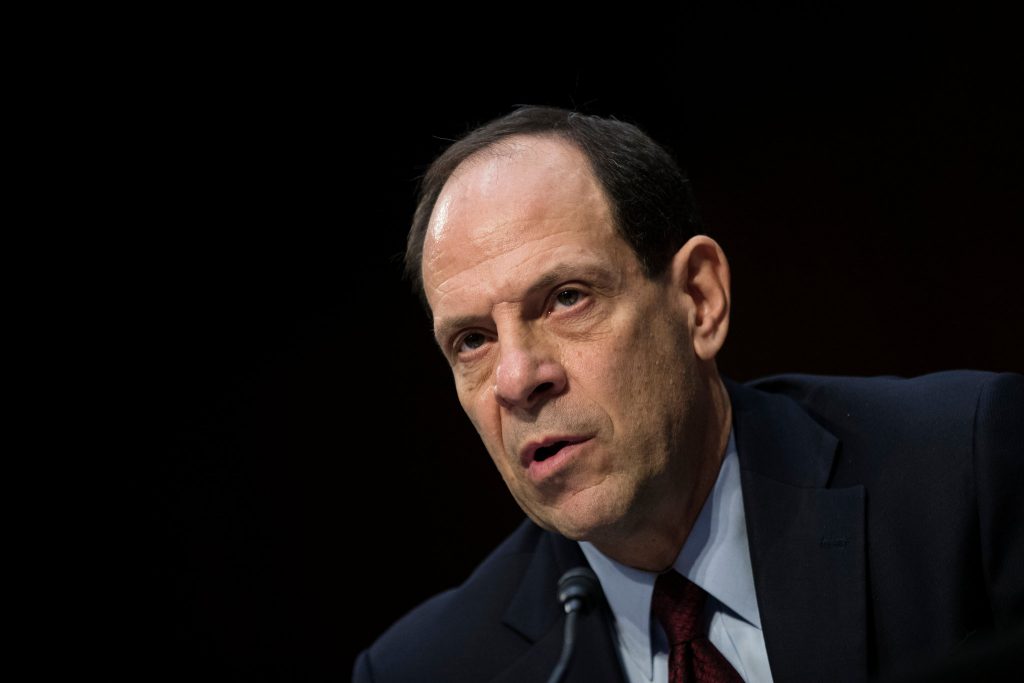Trump Ousts Pandemic Spending Watchdog Known for Independence

The official had been leading the office of the inspector general for the Pentagon. In removing him from that role, the president stripped him of his pandemic relief oversight duties as well.

WASHINGTON — President Trump moved on Tuesday to oust the leader of a new watchdog panel charged with overseeing how his administration spends trillions of taxpayer dollars in coronavirus pandemic relief, the latest step in an abruptly unfolding White House power play against semi-independent inspectors general across the government.
The official, Glenn A. Fine, has been the acting inspector general for the Defense Department since before Mr. Trump took office and was set to become the chairman of a new Pandemic Response Accountability Committee to police how the government carries out the $2.2 trillion coronavirus relief bill. But Mr. Trump replaced Mr. Fine in his Pentagon job, disqualifying him from serving on the new oversight panel.
The move came at a time when the president has been reasserting authority over the executive branch and signaling impatience with independent voices within the government that he considers disloyal. In recent days, he fired an inspector general who reviewed the whistle-blower complaint that led to his impeachment, nominated a White House aide to another key inspector general post, declared that he would ignore certain oversight provisions in the new relief law and attacked another inspector general who criticized virus testing shortages.
Mr. Trump even cheered the firing of the captain of an aircraft carrier for sending a letter to fellow Navy officers pleading for help for his virus-stricken crew, castigating the officer for airing unfavorable information. Only after a loud backlash over the firing and the acting Navy secretary’s speech calling the captain “stupid” did the president partly reverse himself and say he would look into it. The acting Navy secretary, who said he had ordered the firing because he assumed Mr. Trump might have done it himself otherwise, took the hint and resigned on Tuesday.
The questions of accountability and loyalty within the government have been persistent themes in the past three years as Mr. Trump has repeatedly waged war with what he calls “the deep state.” He has rejected the conventional views that figures like the director of the F.B.I., the attorney general, intelligence directors, uniformed military commanders, ethics officers and now inspectors general should have a degree of autonomy.
At his daily coronavirus briefing, Mr. Trump offered no particular explanation for sidelining Mr. Fine but characterized it as part of a larger shuffle of inspectors general, some of them left over from past administrations, and cited unspecified “reports of bias.”
- Help us report in critical moments.
Subscribe today to support The Times
Critics said on Tuesday that it sent a message to government watchdogs to tread softly. “I cannot see how any inspector general will feel in any way safe to do a good job,” said Danielle Brian, the executive director of the Project on Government Oversight, a nonprofit group. “They are all at the mercy at what the president feels.”
Latest Updates: Coronavirus Outbreak
- Wuhan lifts its lockdown, as Europe charts its next moves.
- European finance ministers remain split on ‘coronabonds’ to help the countries worst hit by the pandemic.
- Britain is gripped by concern for the health of its prime minister, and questions of succession.
See more updates Updated 16m ago More live coverage: MarketsNew York
But Mr. Trump’s allies said he felt burned by the investigations of his campaign and associates and therefore distrusts figures he perceives to be partisan foes within government, particularly former F.B.I. officials who obtained warrants under the Foreign Intelligence Surveillance Act, or FISA, to investigate a campaign aide’s ties to Russia.
“I’ve never heard the president express frustrations about independent oversight,” said Cliff Sims, a former White House aide. “But he doesn’t think he should be subjected to his political enemies in supposedly apolitical oversight roles. This has been deeply ingrained in his psyche since the moment he learned that FISA had been abused to spy on his campaign.”
In removing Mr. Fine from his role overseeing pandemic spending, Mr. Trump targeted a former Justice Department inspector general who earned a reputation for aggressive independence in scrutinizing the F.B.I.’s use of surveillance and other law enforcement powers in the years after the Sept. 11, 2001, attacks.
Replacing Mr. Fine as the Pentagon’s acting inspector general will be Sean O’Donnell, who serves as the inspector general at the Environmental Protection Agency and will do double duty for the time being. A group of inspectors general led by Michael E. Horowitz, the Justice Department inspector general, will determine who will replace Mr. Fine as chairman of the new pandemic oversight committee.
Created as part of the coronavirus relief bill, the committee consists of nine inspectors general from across the executive branch and will have an $80 million budget to hunt for waste, fraud, abuse and illegality in the disbursement of the $2.2 trillion approved by Congress to provide relief to Americans affected by the pandemic.
In announcing Mr. Fine’s short-lived role last week, Mr. Horowitz had praised him as “uniquely qualified” to run oversight of “large organizations,” citing his 11 years as the top Justice Department watchdog and his four years serving as the top Pentagon one.
“The inspector general community recognizes the need for transparency surrounding, and strong and effective independent oversight of, the federal government’s spending in response to this public health crisis,” Mr. Horowitz said at the time.
Democrats immediately condemned Mr. Fine’s sudden ouster as “corrupt,” in the words of Senator Chuck Schumer of New York, the minority leader. “President Trump is abusing the coronavirus pandemic to eliminate honest and independent public servants because they are willing to speak truth to power and because he is so clearly afraid of strong oversight,” Mr. Schumer said.
Representative Carolyn B. Maloney, Democrat of New York and the chairwoman of the House Oversight and Government Reform Committee, called Mr. Trump’s actions “a direct insult to the American taxpayers — of all political stripes — who want to make sure that their tax dollars are not squandered on wasteful boondoggles, incompetence or political favors.”
Still, it is not a given that Mr. O’Donnell will toe the line at the Pentagon. At the E.P.A., he has issued reports that are critical of Mr. Trump’s appointed administrator, Andrew R. Wheeler, who has sought to limit Mr. O’Donnell’s authority and oversight.
Only last week, after Mr. O’Donnell’s office released a report concluding that the E.P.A. failed to adequately warn communities living in proximity to certain carcinogenic chemicals of their health risks, Mr. Wheeler publicly rebuked the inspector general’s report for its “tone and substance” and demanded that he rescind it. Mr. O’Donnell refused.
Privately, some people within the government’s inspector general community suggested that the appointment of Mr. O’Donnell to the Pentagon post would divert his oversight from the E.P.A., which has continued to move forward with Mr. Trump’s agenda of reducing or eliminating public health and environmental regulations, even as the coronavirus rages.
Before being appointed as the E.P.A. watchdog, Mr. O’Donnell clerked for two federal judges and worked since 2005 as a career lawyer at the Justice Department, most recently in the criminal division working on cases involving fraud, corruption and national security.
At the Pentagon, Mr. O’Donnell will serve in an acting capacity pending Senate action on Jason Abend, a Customs and Border Protection official, who was nominated by Mr. Trump last week to take on the post permanently. Mr. Fine remains the No. 2 official at the Pentagon’s watchdog office.
Late last month, several hours after Mr. Trump signed the $2 trillion coronavirus relief and stimulus bill with fanfare on television, he issued a signing statement challenging a key safeguard congressional Democrats insisted upon as a condition of approving $500 billion in corporate bailout funds: that a special inspector general be empowered to demand information about how the Treasury Department spends the money and who would be required to tell Congress if executive branch officials unreasonably balk.
In his signing statement, Mr. Trump effectively declared that he could control what information goes to Congress about any disputes over access to information about how and why the money is spent. On Friday, he nominated Brian D. Miller, a White House aide, to serve as the special inspector general overseeing the corporate relief.
-
Latest News
-
Top Posts in April



















Comments